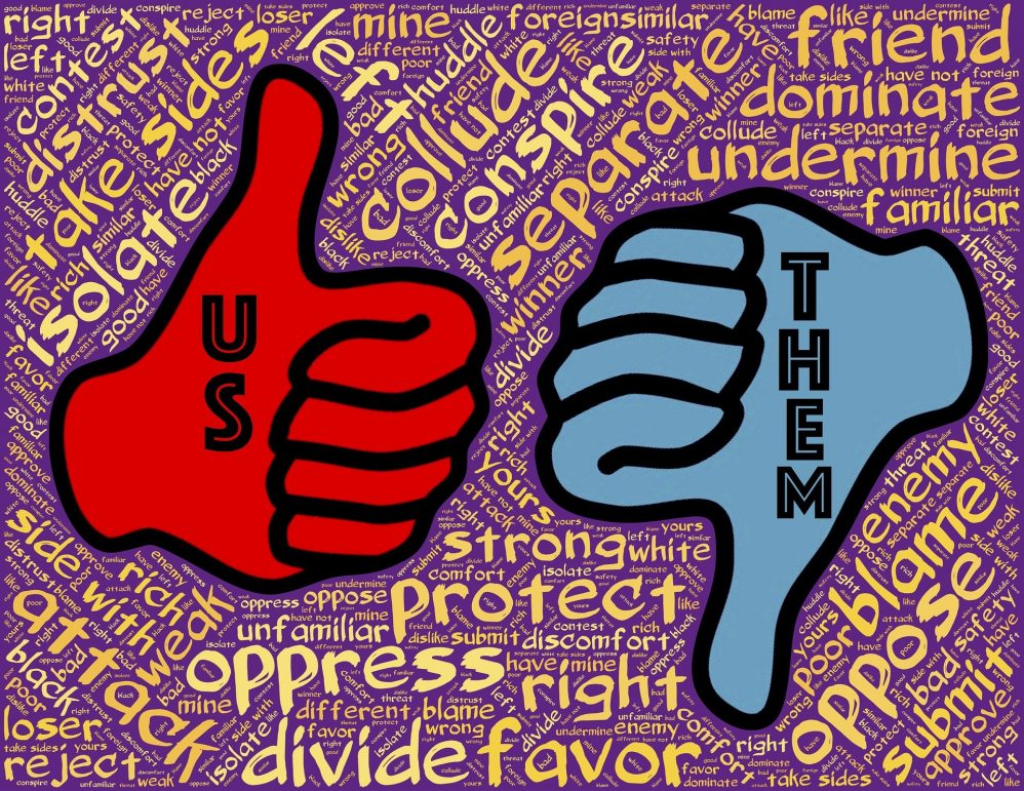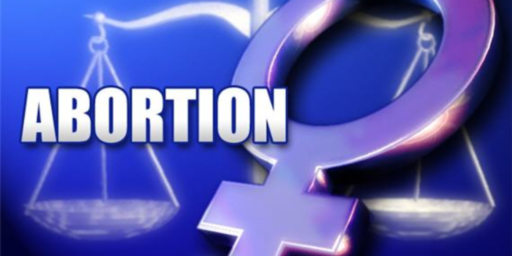The Road to Here (and the Rocky Road Ahead)
The role of American political institutions.

This post really isn’t about abortion, it is about the machinery of policymaking in the United States and it is about the deficit of appropriate representativeness in that machinery. Before I dive into a discussion that will not exactly be foreign to my general scribblings on this site, let me note a couple of things, many of which are likely obvious, but I want to lay down as background predicates.
First, there is a legitimate argument, regardless of one’s position on abortion rights, that from a process point of view, Roe v. Wade was a problematic decision insofar as it relied on the Supreme Court to make a policy decision that was arguably better addressed by legislation. For example, had they left the issue to legislative bodies, it would not have become the central issue for judicial politics in the US for the last almost half-century and maybe we would have found a way to negotiate our way through laws on the subject. It is worth noting that the intensity over the abortion issue in the broader population has grown as a result of Roe making it a major cleavage in our politics in ways that were not the case prior.
There is a lot to disentangle in the above paragraph, but in simple terms, I want to acknowledge that SCOTUS was not the only route this topic could have taken, and may not have been the best for a variety of reasons and that Roe itself became a polarizing issue in our politics because of the nature of where and how the decision was made (i.e., because the decision could then only be reversed by that body or via constitutional amendment). The deepening of partisanship in the judicial nomination process, especially for the Supreme Court is significantly because of Roe–and it has not been healthy for the country’s politics.
Second, regardless of one’s position on abortion, it is not at all surprising that the likely removal of a right that is almost 50 years old is causing a backlash. And, likewise, for the those who have crusaded to remove that right, it is no surprise that they are euphoric at the prospect. It is also true that all this will do is further polarize the country.
Fundamentally, we are where we are in large measure because of the institutional structures of the American government. But, speaking of polarization, the role of our institutions will be recognized by both sides in the abortion debate. The pro-choice side will correctly see that the anti-majoritarian elements of the system worked heavily against them and, likewise, the anti-abortion side will recognize the same, and likely double down on such phrases as “we’re a republic, not a democracy.” They certainly aren’t going to want to hear about democratic reforms. Indeed, I expect an increase in sneering at “democracy” from the right as we go forward.
I have noted on more than one occasion that I fear we are headed for a serious political crisis, and I think a reversal of Roe will help further us down that road because not only will a substantial number of people realize that they lost what they consider to be a key right, they will have lost that right because a minority of the population has more power than the majority. And, moreover, those who believe that they have won a major moral victory will realize they did so because their side, despite being a minority, was able to control key aspects of the system anyway.
This will deepen an already divided public over the very nature of American government and diminish trust in the system by one side while enhancing a belief that being a “constitutional republic” that denies power to the majority is a virtuous arrangement.
To be direct: assuming Roe is overturned in the manner we expect, it will mean that the Republican Party will have managed to take control of the Court largely via Electoral Vote/popular vote inversions (three seats for sure, and arguable five) and because of the way the Senate is apportioned.
Specifically:
- The Democratic candidate for president in 2016 won more votes than did the Republican, and yet the Supreme Court now has three deeply conservative members, two of whom would have been appointed by a Democrat if the presidency required majority support of the population.
- The last time the Republicans in the Senate represented a majority of the population was 1996, and yet they have played a key role in populating the currently Supreme Court, including McConnell’s maneuver to keep the Scalia seat in GOP hands.
- And, of course, Georgre W. Bush came to office in 2000 via another EV/pop vote inversion, and while his two SCOTUS appointees, including Alito, were in his second term, he would almost certainly not have been president in 2004 were it not for eking out his 2000 win via, as one may recall, the result of a 5-4 SCOTUS ruling.
Anyone who says: but that is how the system works! would be correct. And so, if one is a Republican, one is likely to double-down on support for that system because for them it is a winner.
It also means that Democrats are likely to start losing faith in the system.
This is not healthy, to put it mildly.
This is already in the context of widespread belief by one side (ironically, the one that is winning on abortion, if not in general) that the elections process is rigged against them.
That the pro-system party likes the system because it gives them an unfair advantage is also a huge problem.
All of this is a recipe for conflict over the very nature of our government in a way that is not at all healthy.



What I’d love to see discussion on is: Do we seriously think that the majority of human beings in the nation, who also happen to represent a HUGE majority of the GDP, are just going to accept minority rule forever? Does the political right actually think this is sustainable, or they’re just going to hold back the tide as long as they can get away with it?
Since the GQP adores the founders, they shouldn’t be surprised when lack of representation leads to revolution.
I’m old enough to remember the announcement of Roe. It wasn’t regarded as that big a deal. Catholics objected, but Protestants were OK with it, and that was proof it lay on the wrong side of church/state. No one anticipated it could become “the central issue for judicial politics in the US for the last almost half-century”. It did so because Republicans dragged it into the emerging alliance with Evangelicals who were energized by the threat of taxes on their segregated private schools.
I mentioned Karl Popper in the Open Forum. It seems to me your concerns reflect his central argument that the best society is an open society in which institutions can be changed incrementally through non-violent political action. I think the Founders thought they had given us something like that. But they made it necessary to amend the Constitution to make even simple changes like age limits. And they made it way too hard to amend the Constitution.
@PoliticalBiker: Personally, I don’t think there’s one opinion. I’m pretty sure people like Mitch McConnell and Lindsay Graham understand that the demographics are working against them. But I don’t know that rank and file voters think that way. I expect some do, but they want to “go down fighting”.
I think things are going to shift. The Reagan Revolution established a sort of equalibrium, but the coalition it tapped doesn’t really exist any more. The pendulum is going to swing the other way, and you can try to resist to the last, or engineer a soft landing. But the dynamics of electoral politics dictate that office seekers express maximalized resistance.
I’ve heard expressions of contempt for the median voter for a long time, mostly from Republicans, but not exclusively. That always felt like a dangerous place to go. It’s getting moreso. As Steven says, there are troubled waters ahead.
I mean, I kept asking myself during the Trump Administration, “What would it take to get me out into the street?”
@gVOR08: Well, for what its worth, it is way too easy to amend the California state constitution. I believe that a simple majority on a Proposition will do the trick. This is how we got Prop 13, which I consider terrible policy, which does not even serve its aims well.
For other hand, “Roe” (and all the big social reforms decided by the Supreme) was itself a manifestation of the “Republic, not a Democracy”.
@PoliticalBiker:
The right absolute thinks they can get away with it for the foreseeable future, because libtards are a bunch of effimimate soy boys who won’t stand up for themselves.
And there really has been no effort to make Republicans pay a price for norms-breaking or anti-democratic behavior.
Look at what the Republicans are doing to Madison Cawthorn right now — they are basically destroying this vile twit who spilled the beans about the cocaine fueled orgies (at this point, it has to be true, right? They aren’t going after him for funsies, and they tolerate Marjorie Taylor Greene…). I’m not saying he isn’t getting what he deserves, but why didn’t Democrats do this first?
They abuse the filibuster and we just leave it.
The Republicans stole a Supreme Court seat and we did nothing. Expanding the Court is off the table.
They targeted tax increases on blue areas of blue states, and… nothing. (It would be fun if we indexed federal tax brackets by the mean income for a state)
Why wouldn’t they assume they can get away with anything?
I dunno Gustopher, in my calculus they targeted tax hikes and managed to lose several traditionally R districts in Southern CA because of it. I have mixed feelings about it because I feel that capping the mortgage deduction was probably good policy, not bad. I just don’t like what they did with that money.
So, aren’t votes where it counts, and not saying mean things? I think the best politicians of our day, be they R or D, don’t really care if the opposition says mean things about them. Remember the whole, “there’s no such thing as bad publicity”. They tell their story, in a punchy way that gets headlines. Couple that with the assertion that Steven often makes, and he really ought to know, that most voting is more identity based, than message based.
I would add to that that it does matter whether people show up to vote or not, and that’s probably a bigger factor. People can change alliances, but that’s a slow process.
@Gustopher:
I’ve wondered for a while what Obama could have done about the Garland nomination. I’m certain he should have made more noise about it, keeping the story on the news day after day, pressuring Mitch and all other GQP senators in every possible public and private way.
Was there anything more? Could he have sued Mitch to bring the matter to a vote or to set up hearings? I honestly have no clue.
As to the present moment, can Schumer simply pay no mind to the filibuster and hold a vote on any bill at all? I know the filibuster and the 60 votes needed to end it are senate rules, not laws. In other words, norms. If he did and it passed, would Biden sign it? Would the courts uphold it?
If all lawful avenues for addressing grievances (real ones) are closed, there remain two options: submission and violence.
@Miguel Madeira:
It’s a distinction without a difference.
@Jay L Gischer:
I am ambivalent as well, but for much different reasons. I think it probably comes down to different priors.
Let me say at the outset that I don’t know how workable the following proposal would be in a practical sense. Even ignoring that it’s almost assuredly a political non-starter. I’m short, I’m trying to look at this in a vacuum, because of the inherent power of default/status quo.
To me, a better option would be a deduction based upon primary residence. You get one. Any other additional residence is then taxed at a much higher rate. No deduction. No paying for the summer house you spend five weeks in by renting it out and taking any excess as profit. None of that.
Yes, I realize that the profits from rentals are taxed as income. But that, as I’ve stated many times in the past, is (classical) liberal economic policy in name only. Some may consider it a mere rhetorical flourish, but it is closer to some aspects of a feudal order than it is to a liberal society.
Taxation is (at least) as much about incentivization as it is about raising funds. Incintivizing the needs of one as passive income for another is bad policy if the goal of government is to protect liberty and freedom for every individual.
Though Independents are a somewhat nebulous cohort when it comes to political affiliations, I am hopeful that progress toward electoral reform could come from not just Democrats, but Independents, losing faith in the system. With Roe, for example, recent polling show ~70% in favor of keeping it in place. This is not just the partisan will being thwarted, but a clear popular will.
The Republicans can only double-down on cementing a system that denies power to the majority until such time as the mushy middle stops being complacent.
@Jay L Gischer:
As an addendum, putting aside my out of the mainstream views on such things. I still think you may be right about the deduction being good policy. But I admit I haven’t done a ton of work on the matter. From the little I havenlookex, I see the basis for your opinion as pretty sound.
@Miguel Madeira: I mean kinda. It depends on what one means by the phrase.
I think constitutional courts can render rulings about rights that are counter-majoritarian (e.g., Brown) and still be democratic because some rights transcend majority sentiment.
@Steven L. Taylor:
Indeed. Sort of the point to rights is that they should not be subject to the whims of a majority. Apparently five or six Justices believe the right of the favored religious minority to force everyone else to follow their beliefs is a right that should be protected from the majority.
@Kathy:
Obama should’ve nominated Michelle Childs or Ketanji Brown Jackson — or someone else whose maltreatment would have infuriated the Democratic base in an election year. Rather than nominate the milquetoast Grassley told him to nominate. That’s what else Obama should have done.
He also should not have put a Republican in charge of the FBI.
While I can see that argument, can anyone explain how conjuring up, out of thin air, the idea that a fetus now, magically has rights under the US is not just as problematic? From a standpoint of “process” this is tectonic. Why is no one talking about that? Why is it, whenever a conservatives blows a hole in precedent and creates new rights out of thin air that never seems to be a problem. But a decision that, frankly isn’t even in the same galaxy of tortured as “money = speech” or “corporations have rights under the 14th”, is no big deal.
I’m not even going to get into how the interpretation of religious liberty is so biased in favor of Christianity by the right judges it’s an out and out laughing stock.